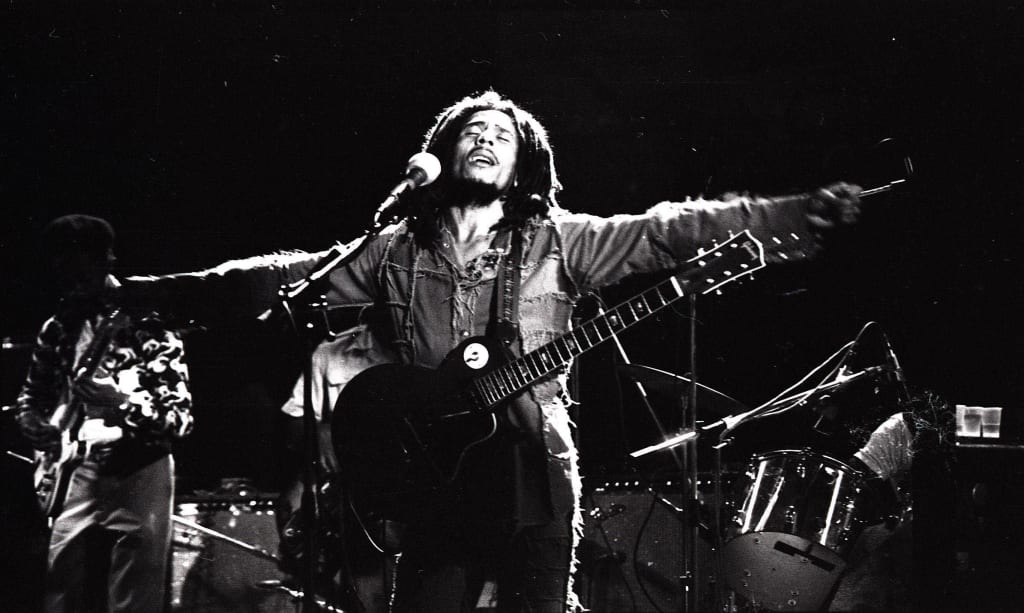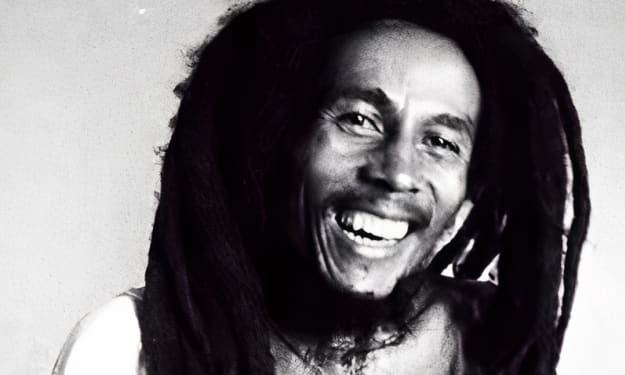The Day the "One Drop" Ended
Mourning Marley on a Miami Afternoon

The concrete bench had a cold, unfamiliar feel. Even though we had gathered at the “Jamaica Corner” at Miami Dade Community College for over a year and a half, trying to recreate the feel of home in Miami, everyone was tense. Barrington "Barry" Salmon (Yes, that Barrington Salmon) stared off into the distance. At the same time, Paul “Lurks” Fakhouri, who would later play a significant role in shaping the sound and impact of The Miseducation of Lauryn Hill, fidgeted with the pages of his textbook. There had been rumors, but we kept on holding to hope. No one wanted to believe that Bob could die. But news from everywhere kept pouring in, and it was hard to separate facts from su-su.
We were starting a new semester, but instead of talking about past exams or what was happening in Jamaica, our gatherings were now marked by long, awkward silences. If someone did speak, it was usually about what they’d heard about Bob. One of the women in the group, Elizabeth, said she’d heard that Bob had cut off his locks. “Lurks,” let it slide.
The mood was changing, and everyone seemed as if they were ready to go at each other’s throats. I didn’t say anything. I remembered the last time I’d seen Bob, and he didn’t look ill or as bad as everyone made it sound. I looked across the sliding doors of the Writing Lab where I worked. Nadia, the Colombian girl, hadn’t come back from her lunch break.
I couldn’t stay with my friends. I got up, nodded to “Lurks,” and walked to his side. I told “Lurks” that I was going to take a walk over to the Pepper Pot Restaurant and asked him if he needed anything. He said he was cool. I patted him on the shoulder, said my goodbye to the group, and made the long walk across the campus. The grass had been freshly mowed, and the sprinklers were going full blast. It was one of those days in Miami when life was just Irie: “Sun is shining, the weather is sweet/Makes you want to move, your dancing feet.”
I crossed 27th Avenue and walked past the sub shop and bakery down to the Pepper Pot Restaurant, which Albert Lee owned. At that time, Pepper Pot was one of the few places that served real Jamaican and not “Ja-fake-an” meals. It was always crowded because Jamaicans, whether they were going North or South along the I-95, would stop in to eat some of Mr. Lee’s scrumptious dishes: curried goat, stewed peas, chicken soup, or ackee and salt fish.
When I walked inside, the bells on the door rang, and the smell of curry, thyme, and onions greeted me. The restaurant was almost empty. I walked up to a stool and ordered the stewed peas from the cashier. She rang a bell, and the cook returned and picked up the order.
Mr. Lee, a short, jovial man with a thin mustache, came from the back of the restaurant and turned up the volume on the radio to Kool and the Gang’s “Celebration” on WEDR. Mr. Lee was doing his little dance and eyeing the cashier. When the cook came with the meal, which was placed in an aluminum tray with a clear, plastic cover, my mouth began watering at the sight of the plantains, stewed peas, white rice, and sliced tomatoes. I lifted the lid, and the flavorful goodness rose with the steam.
“Hope you like it,” said Mr. Lee as he glanced at the waitress.
I started with my favorite, the plantains, and poured a few droplets of Pickapeppa to give the meal just the right heat. The plantains were moist and sweet. The cook hadn't burned them as he sometimes did. I was just about to dig into the meat when the news came over WEDR: “We interrupt our show to announce the death of reggae superstar Bob Marley who died…” I don’t remember anything else he said. The DJ played “Wake Up and Live.” I was now angry with the selection, but I imagined what Bob would have said, “Crazy baldhead.”
I needed to cool down. I ordered a Red Stripe from Mr. Lee, who was visibly shaken by the news. He lowered the volume on the radio.
“Bob used to come here and eat,” he said and pointed to a Survival poster that he said had been signed by Bob. “He used to eat right over in that corner there.
I couldn’t take another bite. I popped open the Red Stripe and sipped it. The bubbles lingered on my tongue. A harsh, metallic sunlight flashed off the cars, flitting by on 27th Avenue.
Bob dead? How could that be? No, they were lying. They had to be. I took another sip of the beer and remembered the earliest times the songs that I had loved by the Wailers: "Simmer Down," “Put it On,” “Nice Time,” “Trench Town Rock,” "Concrete Jungle," "Rebel Music," “Natty Dread,” and “So Jah Seh.” Bob’s music had been the source of some of my earliest political beliefs, and his music had guided my life and work.
At a time when many critics had pronounced rhyme dead because it wasn’t “organic,” Bob’s songs proved to me that if it wasn’t rhyme that was at fault, it was rhyme in the hands of people who couldn’t write. In four short lines and using rhyme in ordinary speech, Bob captured the trauma of the African diaspora in the Americas and the depths of Lamentations: “How many rivers do we have to cross/Before we can talk to the boss?/All that we got seems lost/We must have really paid the cost.”
How many times? How many times in my deepest depression did I sing along with Bob, “Darkness has covered my light/and has changed my day into night.” How many times had I stood by a dawta’s gates and hummed in the back of my head, “Is it feasible, I wanna know now/For I to knock some more?” or played for Nadia on the wobbly turntable in the back room of the Writing Lab: “We'll be together with a roof right over our heads/We'll share the shelter of my single bed.” How many times?
I gulped down the rest of the Red Stripe and nodded to Mr. Lee. What more was there to say? All of our lives had been lessened. Bob's legacy would be his music. I opened the door, and the bell rang. A blast of hot air gushed into the restaurant. The DJ said it was going to be another scorcher in Miami with no rain in sight. What did he know? He couldn't even get the tribute right.
I started the long, slow walk back across the boulevard toward the campus. It felt like I was carrying a heavy yoke on my neck, yet the lyrics, "Good friends we've had /O good friends we have lost/along the way," helped me to "push on through."
I decided to stay away from the “Jamaican Corner.” I would go to the library and stay away from the Writing Lab. I didn’t want to get Nadia in trouble because her family was putting her through hell because she was going out with a Jamaican and her sisters’ friends were everywhere. We would lay low.
Or if I did go back to work, I would find something to do in the workroom—something boring, monotonous, and repetitive to take my mind off what had happened. I couldn't listen to Kaya, the LP I’d left on the turntable in the Writing Lab, because I didn't want to break down in public.
It was going to be dread.
About the Creator
Geoffrey Philp
I am a Jamaican writer. I write poems (haiku & haibun), stories & essays about climate change, Marcus Garvey, music icons such as Bob Marley, and the craft of writing. For more info, visit my webpage: https://www.geoffreyphilp.com/
Enjoyed the story? Support the Creator.
Subscribe for free to receive all their stories in your feed. You could also pledge your support or give them a one-off tip, letting them know you appreciate their work.







Comments (6)
This is such a great story. The details you remember being us right there with you. Well done.
Great writing
Congrats on your top story! Fascinating read.
Congrats on Top Story!🥳🥳🥳
I was only in 6th grade when he passed. I don't remember the details of the day, per se, but I still remember the general mood and vibe in Jamaica that ensued in the following days. The prevalence of his music everywhere, signs proclaiming Bob to be a prophet, the general shock and sorrow. For me, the most impactful memory isn't of the day he died, or the breaking news. What struck me the most at that time and has impacted my life until this day in what is, perhaps, an unusual way was the broadcast of his public memorial service at the National Stadium. Of course, back then we only had JBC on the TV. I have watched that footage many times in the ensuing years and, as I got older, his music became even more entrenched into my life. With the recent release of the One Love movie, a lot of thoughts and memories have been swirling in my head, but really, Bob's impact has never been too distant anyway.
I was 7 when he died, and I do remember the coverage of it. Still feels like a bad dream...